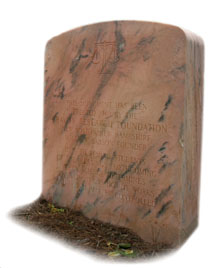|
Précis
| Summer 2003
 •
The gravity monument,
which stood for almost four decades beside the former Physics
Building prior to being placed in storage four years ago, has
been relocated to a courtyard next to the new Math and Science
Center. “It’s
a nostalgic and memorable symbol of the old Emory,” said
Ray DuVarney, associate professor and chair of physics, who
led the drive to have the monument returned to campus and is
planning a rededication ceremony, possibly during Alumni Weekend
this fall. •
The gravity monument,
which stood for almost four decades beside the former Physics
Building prior to being placed in storage four years ago, has
been relocated to a courtyard next to the new Math and Science
Center. “It’s
a nostalgic and memorable symbol of the old Emory,” said
Ray DuVarney, associate professor and chair of physics, who
led the drive to have the monument returned to campus and is
planning a rededication ceremony, possibly during Alumni Weekend
this fall.
•
African American
Studies blossom at Emory: The South may lay claim
to the most troubled chapter of African-American history, but
in the last century these dark roots have grown into a flourishing
artistic and intellectual black culture. Emory’s location
in Atlanta, a locus of Southern black life, has made it a natural
magnet for African-American studies, and two recent English
faculty appointments have sent a surge of energy through the
program and secured Emory a place among the country’s top
centers of black scholarship.
•
Assistant Professor Natasha Trethewey has received
a 2003 Guggenheim Fellowship, awarded on the basis of distinguished
achievement and exceptional promise of future accomplishment
from the John Simon Guggenheim Memorial Foundation. She is the
author of two acclaimed collections of poetry: Domestic Work
(Graywolf Press, 2000) and Bellocq’s Ophelia (Graywolf,
2002). Trethewey
is Emory’s first Guggenheim Fellow.
•
Point of Entry:
The
snarled intersection of medicine, mental illness, and public
policy is a health hazard, says Associate Professor Benjamin
Druss, the first Rosalynn Carter Chair in Mental Health. “There’s
a mismatch between how our health-care systems are structured,”
says Druss, who came to Emory in December 2002 from Yale’s
Department of Psychiatry and Public Health.
•
Academic chair took on a new meaning at Emory this spring with
the Chairs
Project, a juried exhibition of thirty-seven
indoor and outdoor sculptures organized in honor of the opening
of the Schwartz Center for the Performing Arts.
•
Michael J. Perry, the new Robert W. Woodruff
Professor of Law. Perry comes to Emory this fall from Wake Forest
University, where he holds the University Distinguished Chair
in Law. Perry is nationally known for his work on the relationship
between morality and the law.
•
Michael J. Mandl has been named Emory’s
new executive vice president of finance and administration.At
Duke, Mandl served as the chief financial services and budget
officer since 1999, supervising the financial division, capital
planning, sponsored research, and the enterprise wide administrative
systems group.
•
John
Wegner
was recently appointed by President William M. Chace as Emory’s
first campus environmental officer. This
new appointment, the first of its kind at a university Georgia,
is a direct response to a recommendation made by a special task
force created to help implement the University’s Environmental
Mission Statement.
•
Robert A. Paul has been named dean of Emory College
and of the faculty of arts and sciences. Paul had been interim
dean since fall 2001. Prior to that, he was dean of the Graduate
School of Arts and Sciences. “Bobby Paul brings immense
experience, considerable understanding of the intellectual life
of the academy, seasoned wisdom, and great dedication to his
role at the University,” said President William M. Chace.
“I welcome him to his deanship, for I know he will honor
it.”
•
Royalty among us:
After
years of study and conservation, the most famous mummy in the
museum’s collection is on view for the first time in “Ramesses
I—The Search for the Lost Pharaoh.” After the exhibition
concludes on September 14, the Egyptian ruler will be returned
to the Cairo Museum.
•
Two lives in letters: The
“spiritual marriage” between Nobel Prize-winning Irish
poet William Butler Yeats and political activist and actress
Maud Gonne, a tender and tormented affair of the mind that lasted
nearly half a century, unfolds in a collection of letters recently
acquired by Special Collections of Emory’s Robert W. Woodruff
Library.
•
Faith healing?: In
an age of CAT scans and magnetic resonance imaging, when physicians
have been replaced by technicians, it is easy to forget that
society’s original healers were priests and shamans. “Medicine
began in magic and was suffused with mysticism, and much of
its healing power is still by use of various forms of magic,
whether by that name or not,” says Sherwin Nuland, surgeon,
medical historian, and author of How We Die: Reflections on
Life’s Final Chapter. “We have certainly not paid
sufficient attention to the spiritual needs of our patients.”
•
Martha Albertson Fineman, one of the nation’s
leading feminist legal scholars, has been named Robert W. Woodruff
Professor of Law at Emory, beginning in spring 2004. “Martha
Fineman is widely reputed to be the leading feminist legal scholar
of our generation,’’ says John Witte Jr., Jonas Robitscher
Professor of Law and Ethics, who headed the Woodruff selection
committee.
•
The final frontier: “All
the talk of death being a taboo is just symptomatic of how obsessed
we are with it,” says Associate Professor of American Religious
History and Culture Gary Laderman, “All human cultures
are preoccupied with death.”
|